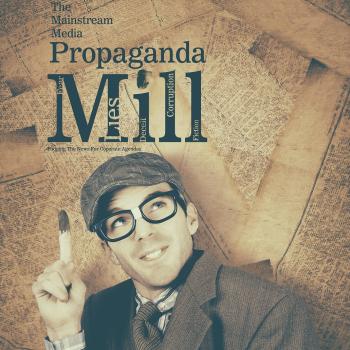I recently had a conversation with another pastor-friend. At one point, we moved on to a controversial topic. I began to share with him that I had been rethinking the issue.
Since he was intrigued and since I knew I could trust him, I shared my thoughts. When I finished, he acknowledged that what I was thinking made sense.
Then, I commented, “You realize that you can’t have this conversation with anyone in your Church. You might be able to have it with your wife. But that’s it.”
Isn’t that sad? After all, the Church is the “pillar and foundation of the truth” (1 Tim 3:15). Should not the ability to have conversations in which we disagree with one another but still argue and reason in love be a staple of the Church?
Instead, Christians (especially conservatives) are often considered the most narrow-minded of all people. How will anyone ever change if we don’t create an environment that promotes critical thinking and healthy dialogue? Or are we so convinced that we have a corner on the truth that there is no need for constructive dialogue? For change?
How can prophetic voices ever gain a hearing?
If you wonder what I might be talking about, perhaps we might ask, “How would the average evangelical Church respond if, in a Bible study, a class, or worse yet, a sermon, someone brought up alternative opinions on:
– Abortion
– Global warming
– Immigration
– Trump
– Politics
– Israel’s war on Gaza
– Systemic racism-Critical Race Theory, BLM
– Women in ministry-Sexual oppression–#MeToo.
– Guns
– Christian nationalism
– Capital punishment-Death sentence?
I dare say that in many evangelical churches, this would never happen. And, in the few instances in which it did happen, there would be significant fallout.
This is not hypothetical. It is all too common. It is simply not safe to dissent.
BTW. It is virtually irrelevant to bring up the fact that evangelicals were pro-choice until 1978 (5 years after Roe V Wade), that the historical Church has a divided history on many of these issues, or that Christians in other countries radically disagree with Western Christians on some of these issues.
The influence of money
What goes without saying, but needs to be said here, is how much money drives the discourse. Churches and institutions often know the money will leave if they dissent from the party line.
CT’s efforts improving
Last week, Christianity Today published another article on the situation in Gaza. Its title is “Fadi Lost His Apartment. He Won’t Let the Same Happen to His Church.”
Then, subscripted below the title, it reads, “Gaza’s 700 remaining Christians face exorbitant prices, bombed apartments, and the loss of their community to violence and emigration.”
This is a big step for CT. I want to commend CT for this. Kudos for sneaking in this article. Of course, it was safe. After all, the story was about a Palestinian Christian.
The problem CT faces, of course, is that many of its readers don’t want to hear about Palestinians.
CT’s efforts were not good enough
At the same time, CT needs to be more honest and tell the whole story boldly and prophetically. They need to model the fact that one can love Israel and still call out its injustices. The problem is that CT’s article does not go far enough. The article is full of polemical statements aimed to “defend” Israel—even when its actions are indefensible.
For example, the article states, “On November 26, the IDF bombed a school that sheltered displaced Palestinians. Though reports do not mention the presence of Hamas in this particular school, their fighters often embed themselves among displaced citizens in similar locations.” Unfortunately, Israel has bombed thousands of structures in Gaza. It has bombed every school, hospital, and virtually all of the infrastructure in Gaza.
Now, one might say that in some of these instances, perhaps even many, Hamas fighters were sheltering there. The fact is, however, that Israel has bombed so many of these structures that it is doubtful that Hamas fighters were sheltering in all of them.
So, on the one hand, I applaud CT for noting that the IDF bombed a school that was sheltering displaced Palestinians. But on the other hand, they allow the reader to conclude that Israel’s actions were justified.
CT’s effort to affirm that the IDF has done acts of injustice and that innocent Palestinians have suffered as a result of this was immediately mitigated by the following sentence, “. . . Though reports do not mention the presence of Hamas in this particular school, their fighters often embed themselves among displaced citizens in similar locations.”
If there is no evidence that Hamas fighters were embedded in this school, then perhaps the IDF unjustly bombed a school with displaced Palestinians. CT, it is okay to call a spade a spade!
Later, CT adds, “Though international law considers targeting of religious sites a war crime, this rule becomes void if a site is used for military purposes. The IDF has damaged hundreds of Gazan mosques this year, claiming them as terrorist hideouts and twice Israeli missiles or shrapnel damaged Holy Family’s buildings.”
Again, this effort to defend or even justify the IDF’s efforts to destroy Gaza diminishes CT’s attempt to tell a Palestinian story.
What is worse is that this assertion is not true. A military is not permitted to bomb a religious site under any circumstances.
The “Practical Guide to Humanitarian Law” notes that even if human shields are used, military forces may not use this as a justification to attack: “Even if the use of human shields by a party to the conflict is a clear violation of IHL, military commanders remain bound to obey IHL rules protecting civilians if they still decide to proceed with the attack. Indeed, the presence of human shields in or around a legitimate military objective does not relieve military commanders of their duty of distinction, precaution and proportionality towards these human shields as civilians or otherwise protected persons.”
NB: Thanks to Bruce Fisk for pointing this out to me.
Later in the article, CT acknowledges, “The IDF has damaged hundreds of Gazan mosques this year.” CT, however, whitewashes this admission, stating that the IDF is “claiming them as terrorist hideouts.”
Finally, CT adds, “And twice Israeli missiles or shrapnel damaged Holy Family’s buildings.” The assumption that CT’s readers are left with is that the IDF’s bombing of the Church was justified because they must have been hiding terrorists.
There is, however, no evidence that the Church was hiding terrorists. I have personally spoken with individuals who are intimately familiar with what is happening in the Church, and they assured me that no terrorists are hiding in the Church. They also told me that two unexploded Israeli missiles landed in the sanctuary of the Church.
So, thank you, CT, but please do better. The Church needs your voice. Israel needs your voice. The Palestinians need your voice.
I refuse to put these posts behind a paywall as this hinders the poor from accessing the information. But I can only continue these posts with the support of those of you who can afford to give. So, if you can afford to give $5, $10, $25, or $1 million/month, please do so. You can give a tax-deductible contribution by following this link.
Please share this post and let others know about determinetruth.
If you wish to view this blog on your smartphone through the Determinetruth app, download the “tithe.ly church” app and insert “determinetruth” as the name of the church you wish to follow. Once it is loaded, click on the “blog” icon, and it will automatically load.















